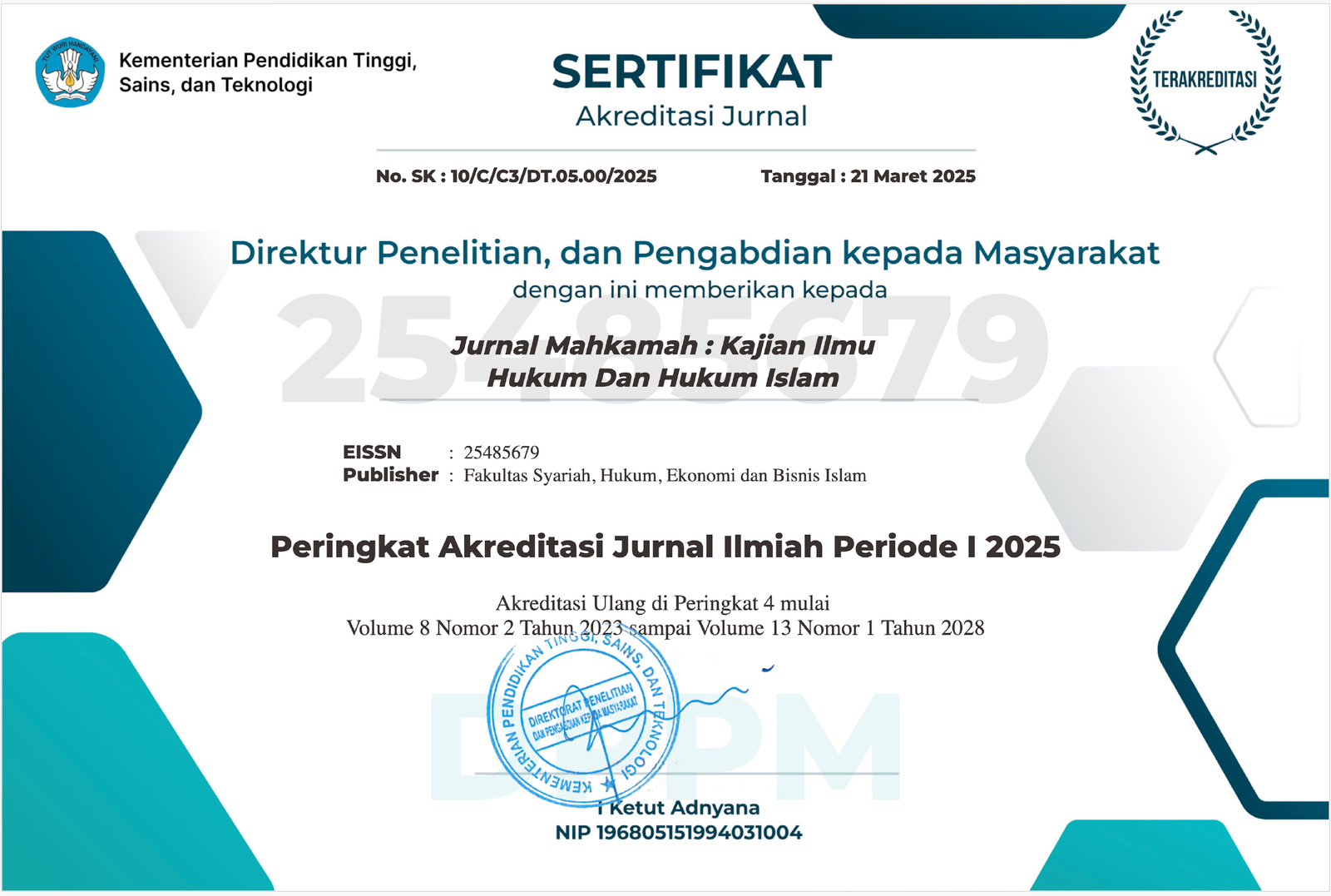Supreme Court's Ultra Vires Rulings Represent a Paradigm Shift in The Judicial Review Conducted by Constitutional Judges
DOI:
https://doi.org/10.25217/jm.v7i2.2709Keywords:
Constitutional Judges, Judicial Activism, Judicial Review, Ultra ViresAbstract
This study focuses on discussing the legal ratio of ultra vires rulings by constitutional judges as a manifestation of judicial activism. The ultra vires ruling has created a dialectic between preventing rechtvacum to uphold constitutional justice and the threat of judicial autocracy because the Constitutional Court exceeds its authority as a negative law. The purpose of this study is to comprehensively describe the dialectics of affirming ultra vires decisions by the Constitutional Court in accordance with human rights based on constitutional justice, as well as to analyze the application of the ultra vires doctrine to the actions of the Directors in hiring workers/labourers with work agreements for a certain time. The research method used is normative legal research with a legal approach and a contextual approach. The results of this study indicate that ultra vires decisions by constitutional judges are an unavoidable legal necessity. This is because normatively, sociologically, and in principle they are not contradictory. Therefore, ultra vires needs to be done with methods and sources to find the right law/constitutional to prevent rechtvacuum and overlapping judges in dealing with problems that are constantly changing without destroying checks and balances and creating a mini-parliament
References
Adiasih, N. (2017). Analisis Terhadap Putusan Pengadilan Dalam Perkara Perdata Yang Hukumnya Tidak Ada Atau Hukumnya Tidak Jelas. Jurnal Hukum PRIORIS, 6(1).
Adji, O. S. (1980). Peradilan Bebas Negara Hukum. Erlangga.
Andiraharja, D. G. (2021). Judicial Review Oleh Mahkamah Konstitusi Sebagai Fungsi Ajudikasi Konstitusional Di Indonesia. Khazanah Hukum, 3(2), 70–79.
Asy’ari, S., Hilipito, M. R., & Ali, M. M. (2017). Model dan Implementasi Putusan Mahkamah Konstitusi dalam Pengujian Undang-Undang (Studi Putusan Tahun 2003-2012). Jurnal Konstitusi, 10(4), 675–708.
Aziz, M. (2016). Pengujian peraturan perundang-undangan dalam sistem peraturan perundang-undangan Indonesia. Jurnal Konstitusi, 7(5), 113–150.
Dachi, R. A. (2017). Proses dan analisis kebijakan kesehatan (suatu pendekatan konseptual). Deepublish.
Hulwanullah, H. (2019). Adikara Constitutional Complaint Pada Mahkamah Konstitusi Republik Indonesia: Disparitas Dimensi Judicial Restraint Dan Judicial Activism. Al-Balad: Journal of Constitutional Law, 1(1).
Hutabarat, D. T. H., Salam, A., Zuwandana, A., Al Azmi, C., Wijaya, C. R., Darnita, Tania, I., Lubis, L. K. A., Sitorus, M. A. P., Adawiyah, R., & Sinaga, R. (2022). Analysis Of The Implementation Of Law In Every Level Of Society In Indonesia. Policy, Law, Notary and Regulatory Issues (POLRI), 1(2), 9–14. https://doi.org/https://doi.org/10.55047/polri.v1i2.80
Loi, M. (2017). Politisasi Kabinet Kerja Indonesia Hebat Jokowi-Jk. JISIP: Jurnal Ilmu Sosial Dan Ilmu Politik, 5(1).
Mahkamah Konstitusi. (2004). Cetak Biru Membangun Mahkamah Konstitusi Sebagai Institusi Peradilan Konstitusi yang Modern dan Terpercaya. Sekretariat Jenderal Mahkamah Konstitusi RI.
Marzuki, P. M. (2017). Penelitian Hukum, Edisi Revisi, Cetakan Ke-12. Jakarta: Kencana.
Memi, C. (2019). Kewenangan Mahkamah Konstitusi Republik Indonesia dalam Pembentukan Norma Baru: suatu kajian terhadap Putusan Mahkamah Konstitusi Nomor 21/PUU-XII/2014 jo Putusan Mahkamah Konstitusi Nomor 46/PUU-XIV/2016. Jurnal Hukum Adigama, 1(2), 474–496.
Munir, S. (2017). Keidentikan Makna Konstitusi Dengan UUD Dalam Sistem Ketatanegaraan. Jurnal IUS, 2(5).
Patra, R. (2022). PERAN MAHKAMAH KONSTITUSI SEBAGAI PENGAWAL DEMOKRASI DI INDONESIA. Jurnal Komunikasi Hukum (JKH), 8(2), 381–393.
Setara Institute. (2019). Kinerja Mahkamah Konstitusi 2018-2019. Setara Institute.
Setara Institute. (2020). Kinerja Mahkamah Konstitusi 2019-2020. Setara Institute.
Susanti, D. O., SH, M., & A’an Efendi, S. H. (2022). Penelitian Hukum: Legal Research. Sinar Grafika.
Tulaseket, R. (2020). Praktik Judicial Activism Dalam Putusan Mahkamah Konstitusi Republik Indonesia. LEX ADMINISTRATUM, 8(3).
Downloads
Published
Versions
- 2023-02-22 (2)
- 2022-12-28 (1)
How to Cite
Issue
Section
License
Copyright (c) 2022 Larasati Nabila, Rayhan Naufaldi Hidayat, Imas Novita Juaningsih

This work is licensed under a Creative Commons Attribution-ShareAlike 4.0 International License.
This work is licensed under a Creative Commons Attribution-ShareAlike 4.0 International License.
Authors retain copyright and grant the Jurnal Mahkamah : Kajian Ilmu Hukum Dan Hukum Islam right of first publication with the work simultaneously licensed under a Creative Commons Attribution License (CC BY-SA 4.0) that allows others to share (copy and redistribute the material in any medium or format) and adapt (remix, transform, and build upon the material) the work for any purpose, even commercially with an acknowledgment of the work's authorship and initial publication in Jurnal Mahkamah : Kajian Ilmu Hukum Dan Hukum Islam.
Authors are able to enter into separate, additional contractual arrangements for the non-exclusive distribution of the journal's published version of the work (e.g., post it to an institutional repository or publish it in a book), with an acknowledgment of its initial publication in Jurnal Mahkamah : Kajian Ilmu Hukum Dan Hukum Islam.
Authors are permitted and encouraged to post their work online (e.g., in institutional repositories or on their website) prior to and during the submission process, as it can lead to productive exchanges, as well as earlier and greater citation of published work (See The Effect of Open Access).









